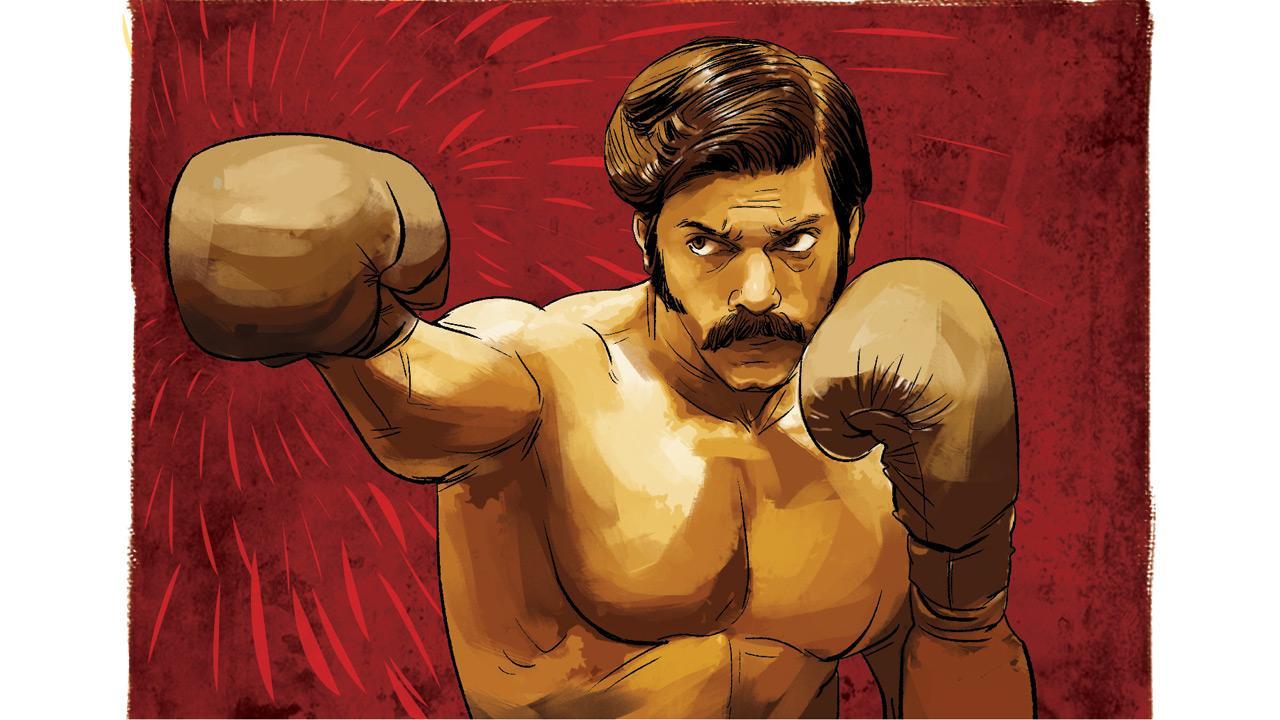The story is of boxing coach Rangan (Pasupathy), whose career is on the decline as his protegees lose in the boxing ring, who agrees to a final do-or-die match

Illustration/Uday Mohite
Once in a while, an Indian film comes along, that knocks you out and sends you reeling with its richness. Pa Ranjith’s Sarpatta Parambarai (The Sarpatta Clan, Tamil) is that outstanding film, starring Arya, set amid the boxing cults of Tamil Nadu, that is streaming on Amazon Prime Video. There have been other boxing films, of course, including Mary Kom, Toofaan, and Sudha Kongara’s wonderful Irudhi Suttru (Final Round, Tamil, with the very hot Madhavan and spunky Ritika Singh; Tokyo Film Festival; Saala Khadoos/ ‘Rude’ in Hindi). The usual boxing film template is underdog triumph story plus romance toppings. But that is low hanging fruit for Ranjith. His film weaves a fascinating, multi-layered tapestry, as a boxing period film set in the 1970s, including caste issues, of course, but also class issues, boxing clan rivalries, politics (the Emergency, decline of the DMK, rise of MGR), Tamil boxing history, questioning of masculinity--all shot amid dock and coal workers, with a documentary grittiness. There are other sprawling epics on labour class struggles in Vetri Maaran’s brilliant Vada Chennai (Tamil), Mahesh Narayanan’s magnificent Malik and Rajeev Ravi’s period film Thuramukham (The Harbour), the last two in Malayalam. And yet, like many of those films, Sarpatta is intimate in its detailing of the characters and milieu. Moreover, there are hat-tips to international figures and politics, with references to Muhammad Ali, and a Muslim boxer called Black Panther Meeran. Bollywood’s last memorable working class films were mainly in the ’70s and ’80s; since then, they have been largely erased, with a few notable exceptions like Gully Boy.
ADVERTISEMENT
The story is of boxing coach Rangan (Pasupathy), whose career is on the decline as his protegees lose in the boxing ring, who agrees to a final do-or-die match. Ranjith racks up the tension by having him cast, not the current favourite Raman, or even his own son Vetriselvan, but a rank outsider, Kabilan (Arya, attractive). Arya, who is not professionally trained, struggles to redeem the honour of a coach he reveres. Ranjith’s direction is absolutely assured, with superb craftsmanship. It is his finest work that I’ve seen; it follows his Attakathi, Madras, Kabali and Kaala. Ranjith’s Neelam Productions is devoted to discussing caste issues through films and music, and he has also produced many films, including Mari Selvaraj’s superb Pariyerum Perumal, as well as Kuthiraivaal, Seththumaan and the forthcoming Writer.
Tamil hero Arya, who has acted in about 54 films, including Naan Kadavul (I am God; Rotterdam Film Festival) and Madrasapattinam (Madras Town), is very good as the boxer. He is a marvellously realised character: big muscled, yet with fragile feelings and career: unable to sustain a boxing career, he becomes a henchman, like his father, who was murdered. At the heart of Thamizhprabha and Pa Ranjith’s brilliant screenplay, is a powerful guru-shishya story, Ekalavya style: the fatherless Arya learnt boxing by watching his guru, and enters the ring only to avenge the guru’s humiliation. It is a story of nobility, a very rare quality in contemporary cinema. Normally, an underdog story triumphs at the end; here Arya’s triumph is mid-way through the film: there is so much more to this richly researched story. Ranjith also constantly questions masculinity: despite those rippling muscles, there are many scenes with Kabilan weeping openly. Ranjith does not need to refer openly to Dalits, but there are plenty of signs, including visuals of Dr Ambedkar, reformer Periyar EV Ramasamy, DMK chief minister Karunanidhi, a Buddha statue, Arya’s blue robe in the final round. Ranjith is also sensitive about inclusivity: Arya is Dalit, but his mother is Christian; there are Hindus, Muslims and Christians in the film, with significant roles. The ensemble cast is superb: Dushara Vijayan, Anupama Kumar and John Vijay are good, but Shabeer Kallarakkal is terrific as the feisty boxer Dancing Rose. Cinematographer Murali G is excellent, so confident that even violent action scenes are staged at night, that you can barely see. Selva RK’s editing is a marvel, making vast material feel brisk in a 2h54 min film. Santhosh Narayanan’s music is superb, making contrapuntal Western music work in local scenes. Anthony BJ Ruban’s sound design is meticulous, as is Tha Ramalingam’s art direction. Big kudos to producers K9 Studios’ Shanmugam Dhakshanraj and Neelam Productions.
Meenakshi Shedde is India and South Asia Delegate to the Berlin International Film Festival, National Award-winning critic, curator to festivals worldwide and journalist.
Reach her at meenakshi.shedde@mid-day.com
 Subscribe today by clicking the link and stay updated with the latest news!" Click here!
Subscribe today by clicking the link and stay updated with the latest news!" Click here!







